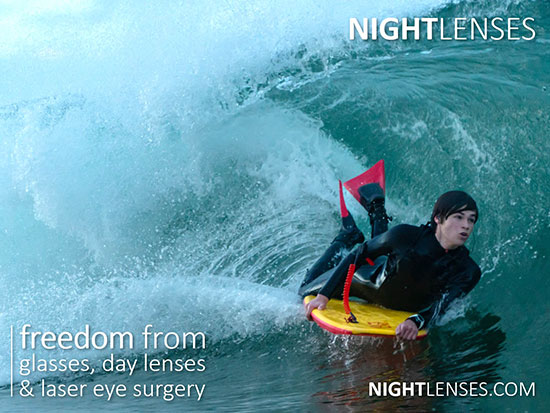Night lenses – Children
No Glasses – No Day Lenses – No Laser Surgery
Perfect vision for short sighted children – without glasses, day lenses or laser eye surgery
Gone are the concerns about swimming or engaging in sports activities. We experimented with sports glasses once during his rugby stint, an experience he despised due to their discomfort and the unwanted attention they attracted.
Prescription goggles seemed like an option, but their reliability waned once they slipped off. Naturally, he didn’t want to wear them on the beach, and glasses simply don’t pair well with sandy shores.

As a welcomed bonus, his myopia (short-sightedness) has stabilized, significantly reducing his risk of future eye diseases associated with myopia [learn more about that HERE]. He was once on track for struggling to see the top letter on an eye chart, but now, he confidently perceives most of them. The day he opened his eyes and marveled at the world unobstructed, my wife and I were practically moved to tears. He wandered around the room exclaiming, “Look, I can see that… wow, I never noticed that on the wall… look out the window… wowsers!!!”
The young surfer featured in the photograph on this page? That’s Benjamin, now 18 years old. He had relinquished surfing at age 12 due to his inability to spot the waves. If there’s a single image that encapsulates the value of night lenses in a child’s life, that one does it justice.
Restoring his “normal sight” was an impactful milestone for us all. I wholeheartedly recommend night lenses to every parent out there. Tom, Proud Father of Benjamin.
nightlenses.com chat | The Burns family
nightlenses.com chat | Annabel | I’ve been wearing them from age 11
nightlenses.com chat with Jaimin, Dylan and Kyal
Dylan and Kyal, both passionate about their sports, eloquently describe how night lenses have granted them a newfound sense of liberation. By eliminating the need for glasses or daytime lenses, night lenses have significantly enhanced their athletic endeavors, making their sports activities notably more manageable and enjoyable. Tune in to this enlightening conversation to discover how the Patel Family’s decision to embrace night lenses has positively impacted their lives and enriched their sporting experiences.
Screen stare | Myopia Progression (Short sight getting worse) | Future eye health risks
In Canada, it’s a familiar scenario: opticians routinely inform us, “Your son/daughter has short sight, let’s fit them up for glasses.” As parents, we often take this in stride. After all, short sight seems commonplace, right? Harmless?
However, imagine if they presented it like this: “We regret to inform you that your son/daughter has Myopia, a condition which, if left uncontrolled during childhood or adolescence, could lead to a 40% increased risk of eye disease in their later years. In the most severe cases, it might result in an inability to see the top letter of the eye chart at their current age or even legal blindness.” Now, that would surely grab our attention.
The term “short sight” is a casual reference to Myopia, a condition that could potentially contribute to eye disease in the future. Consider high blood pressure, a condition linked to heart disease. By managing blood pressure, the risk of heart disease and heart attacks can be reduced. The same principle applies here: early control of Myopia in childhood can yield long-term benefits for your children’s eye health. Left unchecked, their eyesight could deteriorate unnecessarily. However, this decline can be halted through measures such as limiting screen time, spending at least 14 hours outdoors per week, and utilizing night lenses. For more detailed information about Myopia, Myopia Progression, and Myopia Control for your child, you can visit this link HERE.
TOP TIP! We all face challenges when attempting to reduce our kids’ screen time. For children with progressive myopia, it’s essential to understand that excessive screen exposure isn’t conducive to eye health. The provided link includes a simple guide that you can share with your kids to help them comprehend their situation. This guide allows you to walk through the information together and discuss it. An analogy to explain the importance of limiting screen time could be likened to a diabetic managing sugar intake. Just as excessive sugar isn’t beneficial for a diabetic, excessive screen time isn’t beneficial for their eye health. As a compromise, consider streaming content from their mobile device to the TV, allowing them to watch from a reasonable distance on the sofa.
